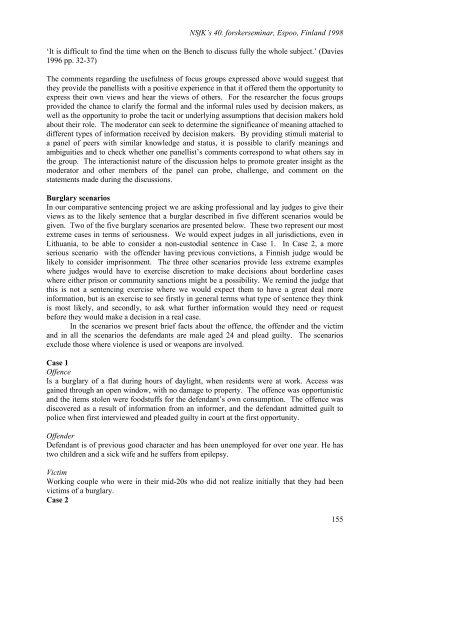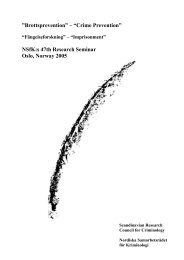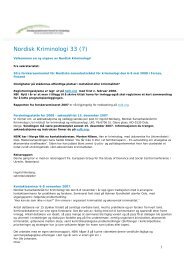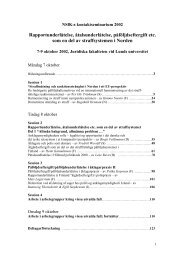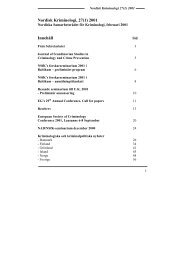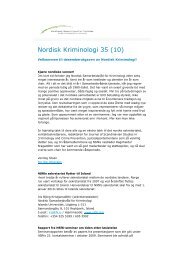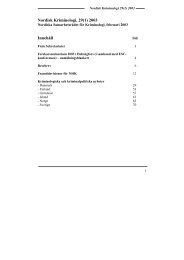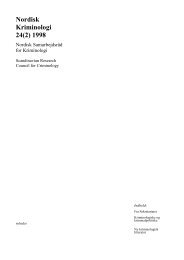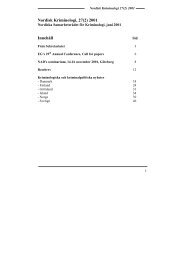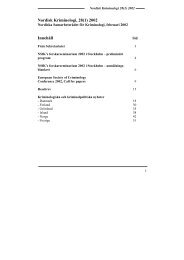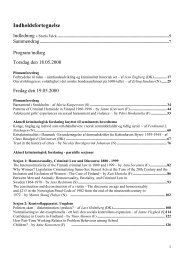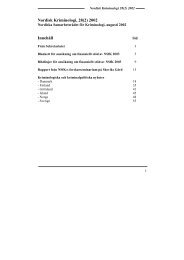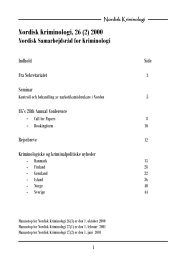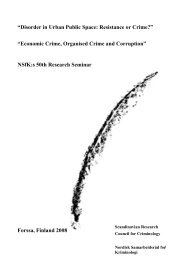Organised Crime & Crime Prevention - what works? - Scandinavian ...
Organised Crime & Crime Prevention - what works? - Scandinavian ...
Organised Crime & Crime Prevention - what works? - Scandinavian ...
You also want an ePaper? Increase the reach of your titles
YUMPU automatically turns print PDFs into web optimized ePapers that Google loves.
NSfK’s 40. forskerseminar, Espoo, Finland 1998<br />
‘It is difficult to find the time when on the Bench to discuss fully the whole subject.’ (Davies<br />
1996 pp. 32-37)<br />
The comments regarding the usefulness of focus groups expressed above would suggest that<br />
they provide the panellists with a positive experience in that it offered them the opportunity to<br />
express their own views and hear the views of others. For the researcher the focus groups<br />
provided the chance to clarify the formal and the informal rules used by decision makers, as<br />
well as the opportunity to probe the tacit or underlying assumptions that decision makers hold<br />
about their role. The moderator can seek to determine the significance of meaning attached to<br />
different types of information received by decision makers. By providing stimuli material to<br />
a panel of peers with similar knowledge and status, it is possible to clarify meanings and<br />
ambiguities and to check whether one panellist’s comments correspond to <strong>what</strong> others say in<br />
the group. The interactionist nature of the discussion helps to promote greater insight as the<br />
moderator and other members of the panel can probe, challenge, and comment on the<br />
statements made during the discussions.<br />
Burglary scenarios<br />
In our comparative sentencing project we are asking professional and lay judges to give their<br />
views as to the likely sentence that a burglar described in five different scenarios would be<br />
given. Two of the five burglary scenarios are presented below. These two represent our most<br />
extreme cases in terms of seriousness. We would expect judges in all jurisdictions, even in<br />
Lithuania, to be able to consider a non-custodial sentence in Case 1. In Case 2, a more<br />
serious scenario with the offender having previous convictions, a Finnish judge would be<br />
likely to consider imprisonment. The three other scenarios provide less extreme examples<br />
where judges would have to exercise discretion to make decisions about borderline cases<br />
where either prison or community sanctions might be a possibility. We remind the judge that<br />
this is not a sentencing exercise where we would expect them to have a great deal more<br />
information, but is an exercise to see firstly in general terms <strong>what</strong> type of sentence they think<br />
is most likely, and secondly, to ask <strong>what</strong> further information would they need or request<br />
before they would make a decision in a real case.<br />
In the scenarios we present brief facts about the offence, the offender and the victim<br />
and in all the scenarios the defendants are male aged 24 and plead guilty. The scenarios<br />
exclude those where violence is used or weapons are involved.<br />
Case 1<br />
Offence<br />
Is a burglary of a flat during hours of daylight, when residents were at work. Access was<br />
gained through an open window, with no damage to property. The offence was opportunistic<br />
and the items stolen were foodstuffs for the defendant’s own consumption. The offence was<br />
discovered as a result of information from an informer, and the defendant admitted guilt to<br />
police when first interviewed and pleaded guilty in court at the first opportunity.<br />
Offender<br />
Defendant is of previous good character and has been unemployed for over one year. He has<br />
two children and a sick wife and he suffers from epilepsy.<br />
Victim<br />
Working couple who were in their mid-20s who did not realize initially that they had been<br />
victims of a burglary.<br />
Case 2<br />
155


